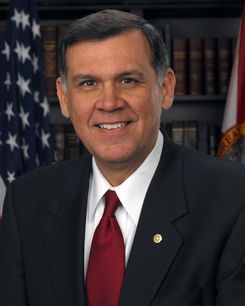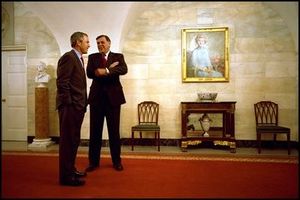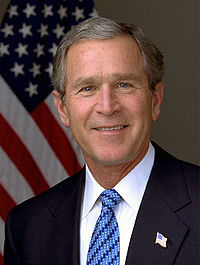Mel Martinez
| Mel Martínez | |
 |
|
|
|
|
| In office January 3, 2005 – September 9, 2009 |
|
| Preceded by | Bob Graham |
|---|---|
| Succeeded by | George LeMieux |
|
12th United States Secretary of Housing and Urban Development
|
|
| In office January 24, 2001 – December 13, 2003 |
|
| President | George W. Bush |
| Preceded by | Andrew Cuomo |
| Succeeded by | Alphonso Jackson |
|
|
|
| Born | October 23, 1946 Sagua La Grande, Cuba |
| Political party | Republican |
| Spouse(s) | Kitty Martínez |
| Children | Lauren Martínez Shea John Martínez Andrew Martínez |
| Residence | Orlando, Florida |
| Alma mater | Orlando Junior College Florida State University |
| Profession | Lawyer |
| Religion | Roman Catholic |
Melquíades Rafael Martínez Ruiz, usually known as Mel Martinez (born October 23, 1946), is a former United States Senator from Florida and served as Chairman of the Republican Party from November 2006 until October 19, 2007, the first Latino to serve as chairman of a major party. Previously, Martínez served as the 12th Secretary of Housing and Urban Development under President George W. Bush. Martínez is a Cuban-American and Roman Catholic. He announced he was resigning as Chairman of the Republican National Committee on October 19, 2007.[1] He is an honorary initiate of the Alpha Tau Omega Fraternity through the Eta Rho Chapter at the University of Central Florida in Orlando.
Martínez resigned his cabinet post on December 12, 2003, to run for the open U.S. Senate seat in Florida being vacated by retiring Democratic Senator Bob Graham. Martínez secured the Republican nomination and narrowly defeated the Democratic nominee, Betty Castor. His election made him the first Cuban-American to serve in the U.S. Senate. Furthermore, he and Ken Salazar (who is Mexican-American) [2] were the first Hispanic U.S. Senators since 1977. They were joined by a third, Bob Menéndez (who is also Cuban-American) in January 2006, until Salazar resigned from the Senate on January 20, 2009, to become Secretary of the Interior. On December 2, 2008, Martinez announced he would not be running for re-election to the Senate in 2010.
On August 7, 2009, CNN and the Orlando Sentinel reported that Martinez would be resigning from his Senate seat.[3][4] Later that month, Governor Crist announced that he would appoint George LeMieux as the successor to Martínez for the remaining year and a half of the Senate term.[5]
Two weeks after resigning his Senate seat, The Hill reported that Martínez would become a lobbyist and partner at international firm DLA Piper.[6]
Contents |
Personal life
Martínez was born in Sagua La Grande, Cuba, to Gladys V. Ruíz and Melquíades C. Martínez.[7] He came to the United States in 1962 as part of a Roman Catholic humanitarian effort called Operation Peter Pan, which brought into the U.S. more than 14,000 children. Catholic charitable groups provided Martinez a temporary home at two youth facilities. At the time Martínez was alone and spoke virtually no English. He subsequently lived with two foster families, and in 1966 was reunited with his family in Orlando.
Martínez received an Associate's degree from Orlando Junior College in 1967, a Bachelor's degree in International Affairs from Florida State University, and his Juris Doctorate from Florida State University College of Law in 1973. He began his legal career working at the Orlando Personal Injury law firm Wooten Kimbrough, et al.,[8] where he became a partner and worked for more than a decade. During his 25 years of law practice in Orlando, he was involved in various civic organizations. He served as Vice-President of the Board of Catholic Charities of the Orlando Diocese.

In 1994, Martínez ran for Lieutenant Governor of Florida. He teamed up with former Family Research Council President Ken Connor, the gubernatorial candidate. The Connor/Martínez ticket was defeated in the Republican primary, finishing fifth with 83,945 votes, or 9.31% of the vote.
Before becoming Secretary of HUD, Martínez served on the Governor's Growth Management Study Commission. He previously served as President of the Orlando Utilities Commission, on the board of directors of a community bank, and as Chairman of the Orlando Housing Authority.
Serving as co-chairman of George W. Bush's 2000 presidential election campaign in Florida, Martínez was a leading fundraiser. He was one of the 25 electors from Florida, who voted for George W. Bush in the 2000 election. While serving as HUD Secretary, Martinez sat as an ex officio member of the President's Advisory Commission on Educational Excellence for Hispanic Americans.
Martínez and his wife Kitty have three children (Lauren Martínez Shea, John Martínez, and Andrew Martínez) and three grandchildren. He is the brother of Rafael E. Martínez. Mel Martínez lives in the Baldwin Park neighborhood of Orlando (the neighborhood is also home to Florida's other senator, Bill Nelson) and in Washington.
U.S. Senate election, 2004
In November 2004, Martinez was the Republican nominee in the U.S. Senate election to replace retiring Democrat Bob Graham. Much of Martinez's support came from Washington: he was endorsed early by many prominent Republican groups, and publicly supported by key national Republican figures such as Senate Majority Leader Bill Frist. His Cuban background and his popularity in the battleground Orlando, Florida, region both contributed to his appeal to the statewide GOP in Florida. But Internet magazine Salon reported that Martínez wanted to run for governor in 2006, though the GOP convinced him to run for Senate two years earlier instead.
Primary
Martínez's nomination by the Republican Party was far from certain. He was seriously challenged by former Congressman Bill McCollum. McCollum criticized Martinez's background as a plaintiff's attorney, and many Republicans initially feared that Martínez's nomination would destroy the GOP's ability to criticize Democratic vice presidential nominee John Edwards' background. Martínez was also said to be soft on tort reform, a major Republican issue in the 2004 race.
After a McCollum surge in the final weeks leading up to the primary, Martínez fought back in the last week of the race, putting out mass mailings and television ads that called McCollum "the new darling of homosexual extremists," pointing out that McCollum had sponsored hate crimes legislation while a member of the House of Representatives. Martínez pulled some of the more offensive ads from the air after a personal appeal from Governor Jeb Bush, but never disavowed them. The St. Petersburg Times took the extraordinary step of revoking its endorsement of Martínez in the Republican primary and endorsing McCollum.[9]
In the Republican primary on August 31, Martínez won a decisive victory over McCollum (45 to 31 percent). Shortly afterward, he spoke alongside President Bush at the 2004 Republican National Convention on September 2.
General election
Martínez defeated his Democratic opponent, Betty Castor, in a very close election that was preceded by numerous negative television ads from both campaigns. Martínez's margin of victory was small enough that a winner was not declared until Castor conceded the day after the election.
President Bush won in Florida by 52%-47% [10], but Martínez only won 49%-48% [10], with a margin of about 70,000 votes. Martinez did much worse than Bush in the Tampa area, such as in Hillsborough, and Pinellas counties, and in smaller counties such as Liberty and Lafayette. The only counties that Martínez won that Bush did not were Orange and Miami-Dade.
Campaign reporting violations
In August 2006, the Martínez campaign acknowledged that the 2004 campaign had been under review by the Federal Election Commission for more than a year. Following the 2004 election, Martínez originally reported that his $12-million campaign had about $115,000 in debt, according to FEC documents. But the latest revision of that figure shows the original tally was off by about a half-million dollars: his campaign instead owed $685,000 in election expenses.
The FEC has sent Martínez at least 20 letters asking to clarify his 2004 campaign reports. His campaign has spent about $300,000 in accounting and attorney's fees since the 2004 election.[11]
The organization Citizens for Responsibility and Ethics in Washington (CREW), which monitors political corruption, filed a complaint with the Federal Elections Commission (FEC) in August 2006 that charged Martínez with having illegally accepted more than $60,000 from the Bacardi beverage company in the campaign. Bacardi violated the Federal Election Campaign Act (FECA) and FEC regulations – CREW alleges – by soliciting contributions from a list of the corporation’s vendors for these campaigns, and by using corporate funds to pay for food and beverages at campaign events held in the company’s corporate headquarters on May 11, 2004. An amended complaint by CREW in October 2006 alleged similar behavior by Bacardi for Democratic Senator Bill Nelson's 2006 re-election campaign.[12] On October 28, 2008, Republican Sen. Mel Martínez agreed to pay $99,000 in fines for his campaign's failure to comply with federal election laws, including its acceptance of excess contributions, records show.
Documents filed by the Federal Election Commission show the resolution of the long-running dispute with the former general chairman of the Republican National Committee stemming from his 2004 campaign.
An FEC audit found Martínez's campaign accepted a total of $313,235 in contributions that exceeded limits from 186 donors. The fine was agreed to by the FEC on Sept. 10 and was posted a month later in its database.
Terri Schiavo
Despite an absence of a quorum, the Senate approved The Palm Sunday Compromise, formally known as the Act for the relief of the parents of Theresa Marie Schiavo (S. 686 CPS), in the early hours of March 20, 2005, to allow the case of Terri Schiavo to be moved into a federal court. The bill passed unanimously by voice vote and no formal record of the vote was made. Bill Frist (R-TN), Rick Santorum (R-PA), and Mel Martínez (R-FL), the only Senators present, voted for the bill with the remaining 97 Senators not present.
The act was strongly criticized by many on both sides of the political divide for the following reasons.
- The law applied to only one individual. Comparisons were drawn with bills of attainder, which are specifically prohibited by the United States Constitution. While some saw this as a legally flawed analysis since bills of attainder take away individual rights rather than bestow them, the rights of Michael Schiavo, as Terri's guardian, to make decisions on her behalf were stripped away.
- The law was a violation of the separation of powers. Many argued that Congress had exceeded its powers by substituting its judgment for that of the courts and directing the courts on how to proceed. This argument was addressed by Judge Stanley Birch in a highly critical concurrence with the judgment of the United States Court of Appeals for the Eleventh Circuit, given on March 30, 2005.
- The law failed to create any substantive rights. The law enacted by Congress obliged the federal courts only to review the rulings of the Florida state courts to determine whether procedural due process had been afforded. However, there was no serious argument that the Florida courts had violated any constitutionally mandated procedural requirements. Nineteen different Florida state court judges, at various times, considered the requests on appeal in six state appellate courts.
As in the state courts, all of the Schindlers' federal petitions on behalf of Mrs. Schiavo and appeals were denied, and the U.S. Supreme Court declined to grant certiorari – effectively ending the Schindler family legal options.
Staffing controversies
On April 6, 2005, Martinez accepted the resignation of his legal counsel, Brian Darling [13], who was responsible for writing and circulating the Schiavo memo related to the Terry Schiavo case.
Martínez immediately denied all knowledge of Darling's involvement in the situation, noting that he himself had inadvertently passed a copy of the memo to Democratic Senator Tom Harkin of Iowa, believing that it was nothing more than an outline of the Republican proposal. Martínez asserted that the memo "was intended to be a working draft," stating that Darling "doesn't really know how I got it."
The Schiavo memo is the third incident in which Martinez accepted broad responsibility while laying blame upon a staffer for the underlying deed. During the Republican primary, a staffer was blamed for a passage in a campaign flyer painting his opponent Bill McCollum as a servant of the "radical homosexual lobby". Shortly thereafter another staffer was blamed for labeling federal agents involved in the Elián González affair as "armed thugs" [14].
In spite of Martínez's vocal objections to homosexual issues such as gay marriage, he employed two gay men in his 2004 Senate campaign [15]. One of them, Kirk Fordham, would become a figure in the Mark Foley scandal.
Republican National Committee
In November 2006, Martínez was named general chairman of the Republican Party for the 2007–2008 election cycle (Mike Duncan handled the day-to-day operations). Some felt the choice was made in part due to the dip in support for Republicans among Latino voters in the 2006 midterm elections.[16] Some conservatives objected to Martínez's selection, citing his positions on immigration and their general lack of enthusiasm for his performance as senator. Martínez stepped down from this position on October 19, 2007.
Positions
- Abortion: Rated 100% by National Right to Life Committee[17], which indicates a pro-life stance. Morally opposed to abortion even in case of rape or incest, he supports education to reduce abortions, and supports the promotion of alternatives such as adoption. His position on the legality of abortion is unclear, but he has indicated that he would not vote for prosecuting involved parties even in the event of a reversal of Roe v. Wade. In a debate moderated by Tim Russert, Martínez stated:
"The bottom line is I don't plan on prosecuting anyone. When I go to the United States Senate, I'm going to be confirming judges who will go to the courts, and the courts will deal with the issue. This is not up for a vote by the United States Senate." He added, "We're far from prosecuting people in this country over that issue" [18]
- Economy: Supports free trade generally; supports tax cuts; advocates lowering regulation of employers and reducing liability insurance burdens.
- Education: Supports No Child Left Behind Act; advocates more standardized testing; supports school voucher programs; supports English-only education.
- Immigration: In his 2004 campaign, Martínez said "Our immigration policy should first and foremost ensure the security of our great Nation and those individuals posing a terrorist threat should be prevented from entering our country. I strongly oppose amnesty for illegal aliens; our immigration laws should not reward lawlessness" and "I oppose amnesty for illegal aliens. I support a plan that matches workers with needy employers without providing a path to citizenship. Immigration to this country must always be done through legal means" In a 2006 after election platform reversal, he helped craft the Comprehensive Immigration Reform Act of 2006 that would be referred to by much of his own party as "amnesty". (see [19] On June 28, 2007, he would later vote for the Comprehensive Immigration Reform Act of 2007 – which he helped form with other Senate leaders – that would allow many illegal immigrants to become citizens. The bill was defeated through being denied cloture on the Senate floor.
- Environment: Supports funding state conservation preservation funding without raising taxes; supports opening up maximum amount of Forest Services federal land for hunting and shooting sports; supports "voluntary incentives" legislation to make it easier for private landowners to set aside land for hunting, shooting, and conservation purposes.
- Foreign policy
- Cuba: Critical of Cuba's human rights record; supports tightening travel and strengthening the economic and trade blockade against Cuba; supports U.S. government funding of persons in Cuba who are opposed to current Cuban government; opposes foreign aid to countries that oppose U.S. policies; Advocates closure of Guantanamo Bay detainment camp Senator Martínez is also a member of the Congressional Cuba Democracy Caucus
- Iraq: Supports the Bush Doctrine, but has asserted that the U.S. erred in hastily dismantling the Iraqi Army.
- Israel: Supports Israeli self-determination; supports close ties between U.S. and Israel
- Health care: Supports private Medicare and Social Security accounts for new workers; advocates more thorough investigations of Medicare fraud; supports reimportation of drugs from Canada.[18]
- Homeland security: Opposes base closures in Florida; advocates maintaining "the strongest military in the world." Even to the point of spending additional funds to keep Oliver Hazard Perry class frigates in service even after they have lost their air defense missile capabilities.[20]
- Religion: Supports free exercise of religion; opposes "removing all public displays of religious devotion" from society.
- Same-sex marriage and gay rights: Supports an amendment to the United States Constitution to ban same-sex marriage. In June 2006, he is quoted on the matter regarding not amending the Constitution, thus leaving each State to come up with its own laws, "It isn't good enough to say, 'Leave it up to the states.' ... If we leave it up to the states we will see the erosion of marriage that we've seen by activist courts, which we otherwise will not see if we protect the institution of marriage at the federal level". He opposes legislation that would protect employers from firing gays, and has declined to endorse anti hate crimes legislation.
- Senior Citizens: Lead sponsor of legislation to create a nationwide Silver Alert program to help locate missing seniors.
- U.S. Supreme Court nominations: Has voted in favor of all three nominees who were nominated during his Senate tenure: John Roberts (2005), Samuel Alito (2006), and Sonia Sotomayor (2009).
- Welfare: Supports Republican-style welfare reforms encouraging personal responsibility; supports programs for job training and retraining.
- Public housing: Supports providing housing for peoples of a needy situation: physically, mentally, as well as financially. When secretary of the Department of Housing and Urban Development, Senator Martinez played a large part in the construction of housing and continued to do so as a junior senator.
On January 25, 2008, Martínez endorsed Sen. John McCain in the Florida Republican primary of the 2008 presidential election, citing McCain's understanding of national security and economic and foreign policy.[21] McCain subsequently won the primary.
Electoral history
| Florida U.S. Senate Election 2004 | |||||
|---|---|---|---|---|---|
| Party | Candidate | Votes | % | ±% | |
| Republican | Mel Martínez | 3,672,864 | 49.5 | ||
| Democratic | Betty Castor | 3,590,201 | 48.4 | ||
Footnotes
- ↑ Sen. Martínez quits as RNC chairman from USA Today
- ↑ Fast facts: Explanation of Ken Salazar's ancestry from Time Magazine
- ↑ "First on the CNN Ticker: Florida senator to resign seat". CNN. http://politicalticker.blogs.cnn.com/2009/08/07/florida-senator-to-resign-seat/. Retrieved May 12, 2010.
- ↑ http://www.orlandosentinel.com/news/nationworld/orl-mel-martinez-resignation-letter-080709,0,5172927.story
- ↑ http://martinez.senate.gov/public/?p=NewsReleases&ContentRecord_id=d5137a13-cab7-44a1-ae3e-e172600f83d4
- ↑ http://thehill.com/business-a-lobbying/lobbying-hires/59941-ex-sen-martinez-to-join-dla-piper
- ↑ Melquíades C. Martínez Gladys V. Ruíz
- ↑ Orlando Injury Lawyers
- ↑ McCollum for GOP. Editorial by St. Petersburg Times, August 30, 2004.
- ↑ 10.0 10.1 The Washington Post. http://www.washingtonpost.com/wp-srv/elections/2004/fl/. Retrieved May 12, 2010.
- ↑ [1]
- ↑ CREW FILES AMENDED FEC COMPLAINT AGAINST BACARDI USA AND MARTINEZ FOR SENATE
- ↑ Author of Schiavo memo steps forward
- ↑ New gaffe, old Martínez defense
- ↑ Anti-gay Senate candidate has two gay advisers
- ↑ Republicans Poised to Tap Martínez to Shape Message in Advance of 2008 Race
- ↑ Mel Martinez on Abortion
- ↑ 18.0 18.1 "Florida Senatorial Debate: Unedited Realtime Captioning". Americaption, Inc.. October 18, 2004. http://tbo.com/election/101804debate.htm.
- ↑ [2]).
- ↑ Shipbuilding a national imperative
- ↑ John McCain for President (January 25, 2008). "Senator Mel Martínez Endorses John McCain For President". Press release. http://johnmccain.com/Informing/News/PressReleases/00d54849-740d-4667-a186-0dd4a888cf66.htm.
External links
- Biography at the Biographical Directory of the United States Congress
- Voting record maintained by The Washington Post
- Biography, voting record, and interest group ratings at Project Vote Smart
- Issue positions and quotes at On The Issues
- Financial information at OpenSecrets.org
- Campaign finance reports and data at the Federal Election Commission
- Republican Party General Chairman Senator Mel Martínez
- New York Times – Melquíades Rafael Martínez News collected news and commentary
- SourceWatch Congresspedia – Congresspedia profile
- Mel Martínez for US Senate, Campaign site
| Political offices | ||
|---|---|---|
| Preceded by Andrew Cuomo |
United States Secretary of Housing and Urban Development Served under: George W. Bush 2001–2003 |
Succeeded by Alphonso Jackson |
| United States Senate | ||
| Preceded by Bob Graham |
United States Senator (Class 3) from Florida 2005–2009 Served alongside: Bill Nelson |
Succeeded by George LeMieux |
| Party political offices | ||
| Preceded by Charlie Crist |
Republican Party nominee for United States Senator from Florida (Class 3) 2004 |
Succeeded by Marco Rubio |
|
||||||||||
|
|||||||
|
|||||||||||||||||||||||||||||||||||||||||||||||||||||||||||||||||||||||||||||


